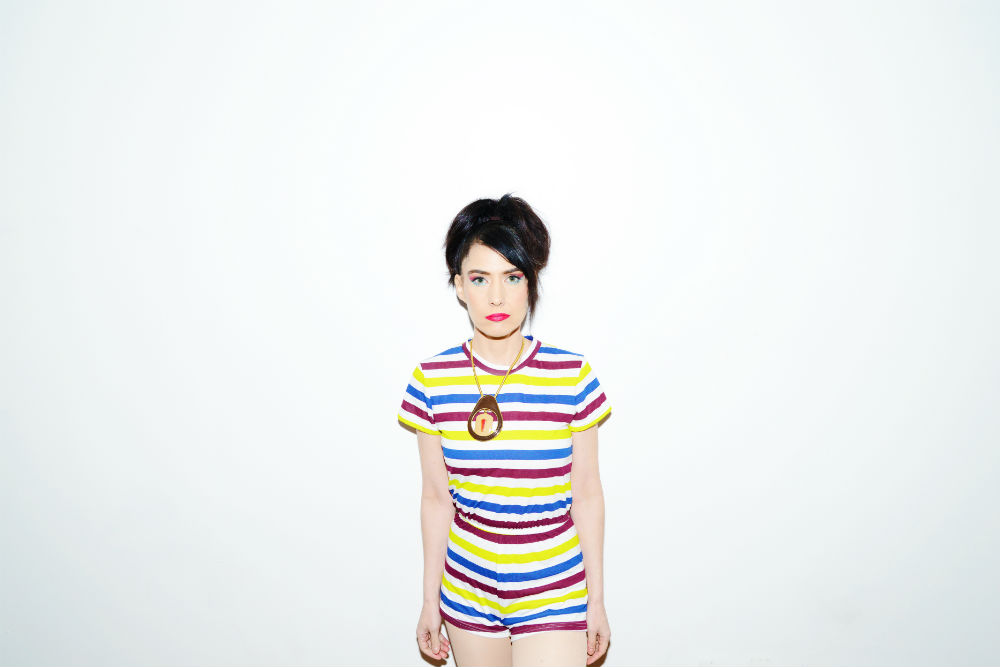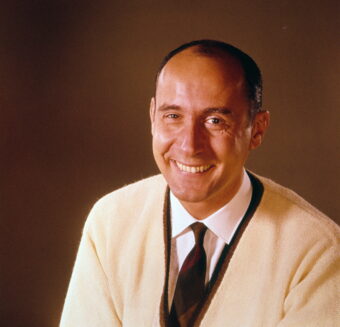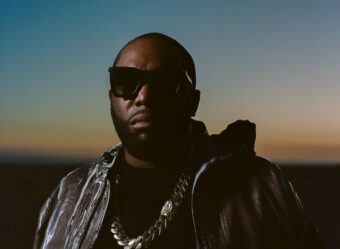At 47, Kathleen Hanna has demolished punk and rebuilt it several times over in the name of grrrls everywhere. Fronting her zine-turned-seminal-band Bikini Kill, she was just what the ’90s needed: a fearless, uncompromising leader who could wail and quote Whitney Houston. They refocused screeching guitar noise to rage against the silence of rape culture, the horrors of patriarchy, and the reduction of women’s space and voices — with a pittance of funding, no PR team, and DIY sonics that didn’t touch radio even in an era when Butthole Surfers could score a hit.
Bikini Kill were also hysterically funny, a crucial and erased distinction that Hanna made unmistakable with her next band, Le Tigre (which formed after a solo one-off as Julie Ruin). The trio released their eponymous dance-punk debut in 1999, two years before DFA Records was founded. Bursting with cheap synths and unexpected samples, it owed more to Blondie than Gang of Four, and predated the anxious electroclash that brought Emma Goldman‘s dream to life.
Shortly after the first major-label release (2004’s This Island) of a curveball-filled career, Hanna disbanded Le Tigre and fell ill with what took five years to correctly identify as Lyme disease. She didn’t resurface musically for another nine years due to the depression and fatigue of battling the sickness. Her condition wasn’t made public until the 2013 documentary The Punk Singer, released two months after Run Fast, the spirited debut album from her new band, the Julie Ruin (not to be confused with the moniker used for that solo record). She toured for the first time in nearly a decade, and the bright, new-wavy songs sounded nothing like the work of a long-suffering patient, despite her (occasionally quite literal) shakiness onstage.
On July 8, the Julie Ruin will release their disquieting follow-up, Hit Reset, which deals far more directly with her tribulations, in both its rougher-edged noise and uncomfortably personal lyrics. You could make a convincing argument for her third band’s contribution to punk as the most crucial: a primer on how to survive in a world that still insists women are lying, well into their 40s. SPIN recently spoke with Hanna over lunch in Manhattan about her iconic history, forays into screenwriting, and triumphs in a sociopolitical battle that may never be over.
Hit Reset feels like one of the darkest things you’ve done in a long time. So many of the lyrics seem to deal with invasion of personal space and the music shares that claustrophobic quality.
Well, you know I got sick, right? And before that I had kind of a crummy childhood where I felt like I was in a really bad, dangerous situation that I couldn’t escape from, considering years of therapy and using my music as a way to get through it, and hopefully helping other girls as a way to get through it, too. Things started really looking up for me, and then I got sick.
I hate the word “triggering,” cause everything’s like, “That’s triggering me! Your iced drink is triggering my non-iced drink.” [Laughs.] But I did feel like now I’m trapped in this body that is dangerous and painful and I can’t get out of: “Oh, wow, this is just like my childhood.” In order to get better I had to confront both. So there’s things that I never sort of unpacked from my childhood, from my life. Part of what kids do in s**tty situations like that is they try to blame themselves as a way to take power.
In order to control things, I flew under the radar. I had different ways that I could feel like I was in control of the situation and keep being safe. Even though it was not true. There’s no way I could have avoided Lyme disease. But I had to finally admit this wasn’t my fault. I had to stop blaming myself for not finding the right doctor or not doing this or that. There’s only so many different diets I could try to help me get better.
My husband [former Beastie Boy Adam Horovitz] just found a picture, and he’s like, “Do you remember this?” And it’s literally a wheelie suitcase, and you opened it and it was filled with medication. I was trying to find some way to control this serious illness by doing yoga or by being gluten-free and eating no sugar or carbs. And then I just had to be like, “You know what? I really just gotta take my medicine and take it one day at a time. I don’t control if I’m gonna get rid of this or not. It’s really in the hands of the universe at this point.” And that’s how I started writing.
This record was sort of a baby step for me to give up control before I did it in my actual life. Like, if I can do this in my songwriting, maybe I can do this to deal with past trauma. Maybe I can give up blaming myself, put the blame where it belongs, and then be like, “that person just had no idea what they were doing and they didn’t have the right skills to make better decisions.”
I didn’t realize until watching The Punk Singer that all three of your bands came out of some deep, personal terror that you had to fight against. I didn’t know that Le Tigre was born from depression, and yet that first record is so bouncy.
Taking the pressure off myself as I’ve done with every project, whether it was the solo record [1998’s Julie Ruin] or the first Julie Ruin band album — all of them have been ways for me to find my way back to myself, not just as the bitch from Bikini Kill or whatever people think of me.
Would you say Run Fast was sort of a distraction from the things you confront here?
Yeah. I feel like the function of the first record was definitely more like, “I need something to look forward to, to get me through this s**t.” And having friends around and playing music… I felt well when I was singing and I didn’t think that was gonna happen. First solo record was like, “I’m actually more complex than any of the stereotypes that have surfaced.” And then [Run Fast] was like, “Hey, I’m somebody beyond the illness.” It really just gave me a reason to keep going. I did write about it but I didn’t delve into some of the harder parts of it. It’s sort of like how after you get out of a bad relationship, you can look back at it and be like, “Oh, here was the warning sign.”
The Julie Ruin seems like a conscious attempt to not have “your identity being so wrapped up in your band” as you put it in The Punk Singer. What is it about the band dynamic that makes you feel more comfortable than say, a longterm solo career?
Yeah, I should fire them. If I did, I’d probably make more money, right? [Laughs.]
I’m working with amazing musicians every night who can sense when I’m changing something and change right with me and who will give me a space to talk in. We’re really on the same page musically and I hope that everybody feels like they can bring ideas in, and everybody has. That’s taken the burden off of me a lot.
The first record I did at home, before I ever found a band. I’d bring a couple of loops in, and they would take it from there. It’s been great working with feminist performance artists, like in Le Tigre. It feels right and it feels normal; it feels like what’s supposed to happen, not pre-planned. It feels creative.
There’s something to be said for having others on the ship along with you; even the very idea of being a solo artist usually means having a lot of collaborators.
I was actually just thinking about that on the way over here, listening to that collection that had the demo of Michael Jackson’s “Love Never Felt So Good.” I always thought, “Oh, I have to have my lyrics ready,” instead of trying things with melodies and fake words, which is what he did. I’ll go through 30 different versions, walk away from it for a week, come back and be like, “Okay, these two are good ideas.” Then I’ll start cutting and pasting. There’s the controlled side of it, like fine-tuning with a tiny screwdriver, and then there’s the side where I’m letting myself have a big paintbrush to just do whatever the f**k I want and then edit it later.
I recently was asking someone who knows a lot more than me about why feminism has had to come in waves, and the title Hit Reset reminds me of that idea, that your rights are always under threat and in need of restating.
I’m gonna use that and say that’s the reason [for the title] from now on. No, I was listening to NPR, and it was this thing about PTSD, and they were specifically dealing with war veterans more than victims of domestic violence or rape, sexual abuse, and stuff like that. And they were working on this thing that could selectively erase the bad memories. I was like, “God, sign me up for that test.” But what else do you lose? That was kind of my idea; I need to let this stuff go so I can hit reset and have my next life, whatever that’s gonna be. If it’s gonna keep being music, or a sitcom where me and Chris Rock get married.
Speaking of TV, can you tell me about the pilot that you and your husband made for Comedy Central?
Yeah, it was for [entertainer] Bridget Everett, whom we did these secret shows for when I was sick. Her stories are so funny and devastating and tragic and I felt like, “Oh, wow. We have the same mom, or the same dad.” I started following her like the Grateful Dead, going to see every show. Adam joined her band and we just were like, “she should be a super-famous star.”
She’s done tons on her own, I definitely don’t want to take credit for the fact that she’s really taking off right now. But when I was using medical marijuana, I would get super-stoned and just write these episodes to this TV show called Bridget Drives the Bus, to be a vehicle for her. It was a mixture of John Waters meets I Love Lucy. She was supposed to be this alcoholic who drove a bus to school full of kids. We sold it to Comedy Central but then they decided that they wanted to do a comedy special to introduce her to the world first. I’m just waiting to hear in a couple years if they’re gonna give me a call… I mean, they paid us for the pilots.
I don’t know a lot about your comedy background —
None. I started to see so many of my friends use humor as a way to deal with tragedy and trauma. Watching how my friends do it, and Bridget especially does it… I get to make jokes about incest because I lived in a house where it was, like, five inches away from me at all times. And I’m not saying my dad specifically did anything, but it’s like, you can live in an incest household without having…physical action [actually] happen. So it’s like for Bridget to make jokes about stuff like that, it’s so powerful for me because I’m sick of how many times you hear a f**king rape joke out of Daniel Tosh’s mouth and threatening someone in the audience. But to see a woman on stage being able to make jokes about really, really heavy things like the death of her sister, it’s so powerful. Hopefully [the show] will come out. Adam and I [also] have some movie summaries written that we’d like to sell.
Anything that you’d like to share?
Oh God, I can’t! Somebody’ll steal it.
I’ve always been surprised when people are expecting your lyrics to be humorless — Bikini Kill has so much irony. And on the new record, “Mr. So and So” [“I’ll show your autograph to your Women’s Studies class / Without hearing what they have to say”] is hilarious for all the same reasons that it makes me feel bad about myself.
[Laughs.] But I also wrote that from the “I” position for a reason, because I am “Mr. So and So” to other people. I didn’t want it just to be an accusatory thing. I was meeting all these younger bands and hearing all these women having all the same f**king problems that I had, and hearing about this publicist who was doing all this bad stuff to all these women. I’m starting to feel like, “Wow, what we did was totally useless.” But I know it’s not, ’cause we’re talking about it and I know that back then we weren’t talking about it at all.
I was like, “F**k it. I want to write a song about tokenism.” Every f**king show we walk in to play, they’re playing Sleater-Kinney. And I love Sleater-Kinney, do not get me wrong, but they don’t have any other CDs with female singers on it? Why don’t you play the Dicks or Black Flag? It’s not like all we do is listen to Heavens to Betsy and Bratmobile in the car.
It’s an issue that there are so many other bands, and it always feels weird to see just one representative of a movement or an era. Which isn’t to knock the status of Bikini Kill, but lots of people don’t know who Team Dresch were.
It’s frustrating for me. I want people to come see us play ’cause I really love playing shows, so I do interviews now. But during the whole Bikini Kill era, we didn’t have a publicist, a manager, nothing. I got pulled out as the frontperson of the band, and the frontperson is the most vocal and obnoxious. That was really frustrating ’cause being set apart kind of uprooted me. Especially when your whole thing is community, like, “We’re all equal here, we’re all peers working together.”
We were all young, we didn’t know how any of this happened, I didn’t know what a publicist was. When all of a sudden I was in a magazine, people assume I had something to do with it. But it was never photo shoots, it was always pictures of me on stage. Hopefully someone’ll read this article and be like, “Yeah, I don’t want to walk in and have to hear Sleater-Kinney. I love them, but I’m super-into Black Sabbath.”
If you really wanna know, I once listened to “Iron Man” nonstop for an entire summer, just the single. Every day. We were at this beach house, me and my best friend… All we had was a record player with “Iron Man,” and we didn’t like the song on the other side. Every morning we would just make coffee and put on “Iron Man.” Put on our bathing suits, listen to “Iron Man,” come home, listen to “Iron Man” again. I don’t even remember being at the beach. I just remember waiting for the bathing suit to dry and “Iron Man.”
There isn’t as much punk for people going into their 30s or 40s, and a lot of the stuff on this new record is more nuanced, about living with or working with your oppressors versus just banishing them. It’s almost like you’ve come to terms with them being everywhere in some way.
We have to engage with the system to change it. I was on a major label for one record because I just felt like I couldn’t keep bitching about major labels if I didn’t know anything about them. So I learned that they’re not an impenetrable wall that nobody can get through, and there are a lot of good people that work at them and there’s a lot of really stupid executives. But I couldn’t complain about it until I knew more.
When Le Tigre’s “New Kicks” video came out, I remember being optimistic because a major label let you release a collage of protest marches alongside a single.
I enjoy touring in a van more than I enjoy touring in a bus, and I make more money as an indie musician than I do on a major label. But it was great to have health insurance for 45 minutes, and somebody said that was actually kind of sellout. And thank God I had it.
It’s such a different landscape now. We just had payphones [in the ’90s]. We were trying to steal calling cards. We didn’t really have this pressure to engage on the internet. For me it was mail: I read all my mail and I answered all my mail and it was hard because 90 percent of it was kids looking for help — about coming out or sexual abuse issues and stuff and suicide. In reading my mail, I kept myself open to people but I also kept myself open to a lot of people who wrote such horrible, hateful things that were really frightening. [I moved] apartments once because of someone who kept writing these things that were really scary.
Not to excuse horrendous internet harassment, but it seems like people can do it really thoughtlessly, over the course of a few clicks. The idea of someone having the time to drive to the post office or physically put a threat in a mailbox, and not cooling down or physically pulling themselves back from doing it…
There were people who went through so much trouble that they made packages disguised as fan packages with hearts and circles and stuff, glitter all over them, and a fake return address, and the whole thing. And I would open it up and it was like a porno tape with a girl who looked just like me in it.
That “cartoon Cathys” line from “I Decide,” are you literally referring to Cathy the comic strip?
I am not able to say that because people are really litigious over at Cathy. [Laughs.] I have a Cathy doll that on one side says, “I am strong. I am invincible” [from Helen Reddy’s “I Am Woman”]. And on the other side it says, “I am lonely.” What’s the message there?
Most of your encounters with the press during Bikini Kill talked about the activism and the movement, but I always wanted to read about, like, the band’s songwriting process and how you came to try out things like power-pop on Reject All American.
The very, very early Bikini Kill stuff, I would drive around in my old Toyota truck and listen to tapes of practices where I wasn’t singing, and try to fit my words in, all this poetry from high school. I started to see, “Oh, here’s how you turn a poem into a song, you have to have some kind of refrain.” And I also always wrote a lot like it was a political speech that I was giving, you know, the “Riot Grrrl Manifesto.” And I was also interested in sampling, but hidden samples.
How far back does your interest in sampling go?
Dates back to the beginning of Bikini Kill because I wrote, what song is it… “Double Dare Ya,” [from 1992’s Bikini Kill EP] where I sing, “You get so emotional, baby,” which is Whitney Houston.
So many people would be surprised that you were engaging with pop music that early on.
For my birthday when we were on tour, my [Bikini Kill] bandmates rented me a Whitney Houston concert on HBO with their own money, and then went out and left me in their room with a big bottle of water, some french fries, and my Whitney Houston. And I was also super into Public Enemy, so I jogged every day and listened to them on my headphones. They had a huge impact on me: “I want to write a political record that’s really, really good, that people want to dance to.”
In the ‘90s, it was a different world. Somebody said, “She must have taken singing lessons because now she sounds like she can sing.” I just hadn’t been using that part of my vocabulary, and I let myself use it during Reject. That was the record that people said that about. “Oh, she can sing now.” I could actually sing before, too. Women are told we have annoying voices, and that’s why I didn’t want to try to make it pretty for people. But then we did the Joan Jett single [“New Radio”/”Rebel Girl”] and I learned a s**tload of songwriting stuff from working with Joan and Kenny [Laguna], who played in the Archies.
“Calverton” [from Hit Reset] has a defeated, doubtful feel to it. In the wake of your health issues, it worried me to hear.
It was really about my mom and her being the person who I always knew was there for me and loves me. If I didn’t have that, I just know I wouldn’t be alive today. She made me feel like I deserve everything, and it wasn’t like that with my dad. It was like somebody whispering in my ear, “You are amazing,” while somebody else was telling me that I’m nothing. Part of me is this abusive dad, and part of me is this beautiful, hilarious, funny mom, who didn’t have the skills to get out of a situation and loved me very much, and is the reason why I do what I do. Every time anything good happens to me, I know it’s because of her.
Luckily, my health has improved to such a crazy extent that every time I walk the stairs of the subway, or do a normal thing like open the door at the Container Store to buy some hooks for the wall, I’m like, “Wow. I just did that.” But that song is much more about the really bad part where I was just like, “Are you really being loving to me by trying to help me? Maybe we should just call this a day.”
I’ve had a great life, I’d be happy if I dropped dead right now. I kind of came to terms with it. I’m not afraid of flying anymore, so now I can tour. Once you get Lyme disease, you’re not afraid of anything.
On a lighter note, I wanted to ask about you licensing “Rebel Girl” to Rock Band in 2008. I can’t even imagine how many offers you’ve rejected, but I’m glad you took that one.
We’re in a lot of indie movies that we didn’t really get paid for; that band made no money. And the people who are in it, were in it, are still involved, need to pay their rents. I’m in a fortunate situation where I don’t have to pay rent because my husband owns our apartment. My feeling was, this is a way that women are going to hear about our music, and there will be a feminist song in Rock Band. If it’s not, then there’s just an open space. We did this to put something in the blank space, to not keep creating the blank space.
I love how you’re just sprinkled into the mainstream. You’re on Green Day’s “Letterbomb” from American Idiot, which ended up being a huge, political touchstone itself, then you inadvertently gave “Smells Like Teen Spirit” its title.
I’m the Forrest Gump of indie rock. [Laughs.] I was having dinner with somebody and they were like, “Oh, did you hear Green Day is writing a new record?” and I was like, “I want to sing on that!” Two days later, I get a f**king call from Billie Joe [Armstrong, Green Day’s frontman], and I keep asking the person I was at dinner with, “Did you do something?” And they’re like, “No! You wished for that one.” I love that stuff, but I also love how living in New York, nobody really cares who I am. I’m not a household face; I’m sure Billie Joe can’t walk anywhere without getting his picture taken. Something that happened in Bikini Kill that I will tell you is that me, Kathi [Wilcox, bass] and Bill [Karren, Guitar] went and met with major labels just to see.
When was this?
Towards the end, like ‘95, ‘96. I asked them all for their sexual-harassment policies in advance. And then showed up to the meeting and they didn’t have one. And I was like, “That’s really pathetic.” I would never work for a company where the owner of the company is meeting with me and can’t show me their sexual-harassment policy. But we also had some lovely experiences with people at major labels and we were totally demanding all kinds of crazy stuff. We were acting like total brats — we sent “Thanks, but no thanks” postcards to everybody.
And then the Spice Girls came out. It’s like, “Well if you’re not gonna play the game, we’ll find somebody who will.” Sometimes it’s hard to see my husband getting offered hundreds of thousands of dollars to have his song in a movie, and we’re getting offered, like, $500.
At the end of The Punk Singer, you tie the messages of your music to the uphill battle of getting doctors to recognize the existence of your Lyme disease. I’ve known so many women who get dismissed by doctors for being fat, so anything they come in for, they’ll get told to lose weight. I didn’t even think of that as a specific women’s issue until you talked about searching for your diagnosis for five years.
[This doctor] wanted to start me on Enbrel, which is this really serious thing for Crohn’s disease, which I had none of the symptoms of. They went through everything and they were like, “It’s gotta be Crohn’s.” They called me and said, “If you don’t start it right now, your illness is gonna get really, really bad and you’re not gonna have the chance to go backwards.” But my intuition was like, “You don’t have Crohn’s disease.” They wanted me to come into the office and do an IV drip once a month for $5,000 and it basically wipes out your immune system. It would have caused my infection to spread like wildfire and it could have killed me. You’ve got to trust your instincts.
But I was scared… I had a doctor in D.C. who was saving my life. And I would be so scared at our meetings like, “What if he fired me as a patient?” I spent at least $100,000 on that guy. So f**k it, I’ll sell a song to Star Trek at this point to pay myself back. I could have bought a house and helped somebody else. But I had to deal with this stupid thing. It just sucks.
I sent letters to everybody who misdiagnosed me and the one that actually meant the most was my general practitioner, because he [responded] like, “I have a patient whose symptoms are really similar, and looking at his case, he might have Lyme. Can you tell me a little bit more about what you’ve been through?” So I told him, and hopefully helped that guy.





